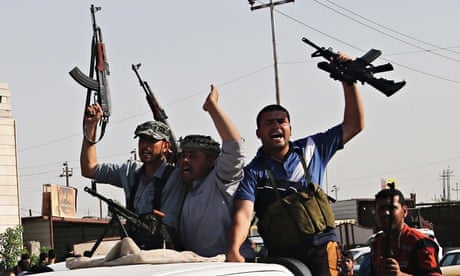It is one of the more intriguing twists of the Iraq crisis: the prospect of cooperation between the US and Iran in the scramble to bolster Nouri al-Maliki's beleaguered government against Sunni extremists seeking to set up an Islamic emirate.
Hassan Rouhani, the Iranian president, has made clear how concerned Tehran is about the success of Isis fighters who have captured swaths of territory – even suggesting on Saturday that Iran might work with the US to halt their advance. On Sunday, however, the tone was markedly more cautious, with an Iranian official warning that "any foreign military intervention in Iraq" would only complicate the crisis. "Iraq has the capacity and necessary preparations for the fight against terrorism and extremism," the foreign ministry insisted.
It does look, though, as if Maliki can count on some discreet help. Qasim Suleimani, commander of the Quds force of the Iranian Revolutionary Guards, has been visiting Baghdad – though Tehran quickly denied this. Suleimani has been a key, if shadowy, figure for the last decade, pulling strings and lubricating links with Iraqi politicians and militias, some with long experience in fighting US forces after the 2003 invasion.
The Brookings Institution, a respected US thinktank, reported over the weekend that Iran appears to have committed three battalion-sized groups of Quds force personnel – likely to be trainers and advisers tasked to improve the performance of indigenous Iraqi units, rather than to fight themselves.
Suleimani also manages Iranian ties with the Lebanese Shia movement Hezbollah, vital in giving Bashar al-Assad the edge over the Syrian rebels fighting to overthrow him. Now another important client, Maliki, is in serious trouble and Tehran is being forced to defend him and century-old national borders that are being eroded by violent jihadis with potentially disastrous consequences for the balance of power across the region.
Iran wields considerable influence in Iraq, though Iraq's Shia majority have good national and religious reasons of their own for fighting Sunni extremism: Ayatollah Ali Sistani, the community's spiritual authority, who is often described as a "quietist," called for Iraqis to defend themselves against Isis.
Tehran is sending out the same message: the Iraqi-born Iranian Ayatollah Mohammad Hashemi Shahroudi, who is close to Ayatollah Khamenei, Iran's supreme leader, urged Iraqis to unite against terrorism. Ayatollah Mohammad Emami-Kashani, another senior Iranian cleric, gave part of his Friday prayer address in Arabic rather than Persian to express support for "the great and brave people of Iraq".
US responses to the crisis have been more transparent but are hard to predict. Barack Obama's decision to deploy an aircraft carrier to the Gulf does not mean combat missions will automatically follow.
Putting American boots back on the ground in Iraq seems unthinkable in the light of the president's instinctive wish to avoid new Middle Eastern entanglements – even when, as in the case of last summer's Syrian chemical weapons attacks, his own "red lines" and wider US credibility are at stake.
Commentators in Tehran and Washington have argued that these old enemies share significant interests in defending the status quo in Baghdad: for example, both had urged Maliki to act more inclusively to stop alienating Sunnis for fear of empowering Isis.
"Iraq is one of those places that contradicts the popular notion that Iranian and American interests constitute a zero-sum game," the analyst Kenneth Pollack, a CIA veteran, commented on the eve of the April elections. "There, what is bad for Iran is often just as bad for the United States and what they want to see is often what we want to see as well."
Whether those common interests will extend to actual, as opposed to de facto, military coordination – US air strikes or drone intelligence in support of Iranian revolutionary guards, or Iranian-advised Iraqi units – remains to be seen. It is fascinating too to speculate whether any cooperation could impact on the ongoing talks on Iran's nuclear programme, a month before the deadline for a deal.
Iraq's Kurds have been clearer in their approach to the crisis. The humiliating flight of the Iraqi army in the face of the Isis takeover of Mosul created a golden opportunity for peshmerga forces – the best-trained and equipped military units in the country – to occupy territory outside the provinces controlled by the Kurdish regional government (KRG), especially in the Kirkuk area.
Erbil – in conflict with Baghdad over oil resources, revenues and territory – has certainly gained some handy leverage over Maliki. But the changes may be a mixed blessing. Aside from having to absorb huge numbers of refugees, the Kurds could face difficulties with their new neighbours.
"The KRG will not only have to secure greater territories and populations from extremist groups on its borders," the analyst Denise Natali warned in Al-Monitor, "but also manoeuvre its nationalist agenda through radicalised Sunni Arab populations that may be even more resistant than Maliki and Shia groups."
